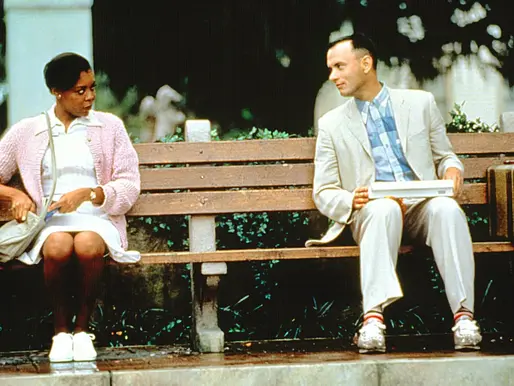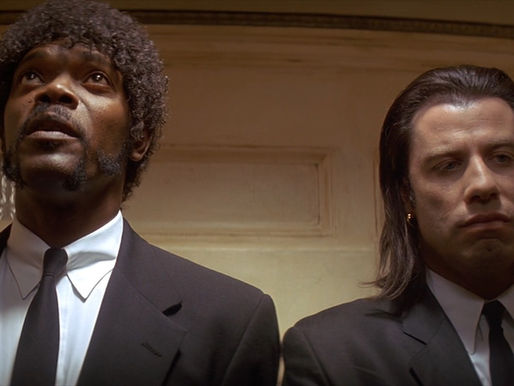top of page
Search
Comedy
Classic Comedy Films from 1930 - 1999


Forrest Gump (1994)
Robert Zemeckis’s Forrest Gump is an enduring cinematic classic that combines humor, heart, and history to tell a uniquely American story. Released in 1994, the film achieved both critical acclaim and massive popular success, winning six Academy Awards including Best Picture, Best Director, and Best Actor for Tom Hanks. It remains beloved for its innovative storytelling, memorable characters, and the way it interweaves a fictional life with real historical events.

Soames Inscker
3 min read


American Beauty (1999)
Sam Mendes’s American Beauty is a darkly comic, sharply satirical exploration of suburban malaise, middle-class dissatisfaction, and the elusive pursuit of happiness. Released at the close of the 1990s, the film captured the anxieties and contradictions of modern American life with striking clarity and artistic flair.

Soames Inscker
3 min read


The Truman Show (1998)
When The Truman Show premiered in 1998, it felt both wildly imaginative and eerily prescient. A surreal, satirical fable about media manipulation, personal freedom, and constructed reality, Peter Weir’s film is one of the sharpest and most original works of the 1990s. Anchored by a revelatory performance from Jim Carrey, it deftly balances existential drama, biting social commentary, and unexpected emotional resonance.

Soames Inscker
4 min read


Toy Story (1995)
When Toy Story debuted in 1995, it not only captivated audiences — it revolutionized the entire landscape of animated cinema. As the first feature-length film created entirely with computer-generated imagery (CGI), Toy Story was groundbreaking. But its technical achievement is only one part of its legacy. At its core, the film is a timeless, emotionally rich, and delightfully entertaining story that appeals equally to children and adults.

Soames Inscker
3 min read


Pulp Fiction (1994)
Quentin Tarantino’s Pulp Fiction isn’t just a movie—it’s a cultural detonation. Released in 1994, it redefined independent cinema, catapulted its director to auteur status, revitalized the careers of fading stars, and reshaped what Hollywood dared to call mainstream. With its intertwining narratives, non-linear storytelling, and stylized blend of ultraviolence and deadpan humour, Pulp Fiction is a bravura piece of filmmaking that still feels dangerous, fresh, and hypnotically

Soames Inscker
3 min read


The End (1978)
The End is an odd, bold, and frequently funny film that tackles taboo topics with irreverence and surprising heart. Though uneven and occasionally too zany for its own good, it earns points for its originality and for showcasing a more vulnerable, daring side of Burt Reynolds. For fans of dark comedy and '70s cinema that refuses to play it safe, The End is a flawed but fascinating gem.

Soames Inscker
3 min read


Libeled Lady (1936)
Metro-Goldwyn-Mayer’s 1936 screwball comedy Libeled Lady is a shining example of the studio system at its most polished and effective, blending the star power of four Hollywood heavyweights with a witty, fast-paced script. Directed by reliable studio hand Jack Conway and boasting an impeccable cast led by Jean Harlow, William Powell, Myrna Loy, and Spencer Tracy, the film sparkles with charm, sophistication, and comedic precision.

Soames Inscker
3 min read


I Love You Again (1940)
Few on-screen pairings in classic Hollywood can rival the enduring charm and comedic synergy of William Powell and Myrna Loy. In I Love You Again (1940), their 9th collaboration, the duo once again delivers a delightful screwball comedy that deftly blends romance, mistaken identity, and con artistry into a briskly entertaining package.

Soames Inscker
3 min read


Love Crazy (1941)
Love Crazy (1941) is a sparkling example of screwball comedy, and a delightful testament to the enduring screen chemistry between William Powell and Myrna Loy. Best known for their iconic roles as Nick and Nora Charles in The Thin Man series, Powell and Loy teamed up for Love Crazy during a time when audiences needed levity more than ever—amidst the mounting tensions of World War II.

Soames Inscker
4 min read


La Dolce Vita (1960)
Federico Fellini’s La Dolce Vita is one of the most iconic and influential films in the history of cinema. Released in 1960, it marked a profound departure from traditional narrative and moral storytelling, signaling the arrival of a new, modernist era in European film. A kaleidoscopic journey through seven days and nights in Rome’s decadent elite society, the film is not only a portrait of a changing Italy but also a timeless meditation on meaning, excess, and the pursuit of

Soames Inscker
4 min read


Double Wedding (1937)
Double Wedding (1937) stands as a classic example of 1930s screwball comedy, bringing together the legendary screen duo William Powell and Myrna Loy in one of their most spirited and eccentric pairings.

Soames Inscker
4 min read


Topper Returns (1941)
Topper Returns (1941) is the third and final entry in the delightfully offbeat Topper series, which began in 1937 with Topper, followed by Topper Takes a Trip (1938).

Soames Inscker
4 min read


Topper Takes a Trip (1936)
Topper (1938) is the spirited sequel to the 1937 supernatural comedy Topper, one of the most charming and original fantasy comedies of Hollywood’s Golden Age. While sequels often pale in comparison to their predecessors, Topper Takes a Trip retains much of the original’s whimsical tone, buoyed by a returning cast, a lighthearted script, and the luminous presence of Constance Bennett.

Soames Inscker
4 min read


That Touch of Mink (1962)
That Touch of Mink (1962) is a classic romantic comedy that captures the glossy charm and societal mores of early 1960s America. Starring the ever-suave Cary Grant and the queen of the rom-com, Doris Day, this film was a major box-office success in its time and remains a notable example of the final golden years of Hollywood’s studio-produced, screwball-influenced comedies.

Soames Inscker
5 min read


The Grass is Greener (1960)
The Grass Is Greener (1960) is a genteel romantic comedy with a razor-sharp wit and a star-studded cast, wrapped in a quintessentially British setting. Directed by Stanley Donen, best known for musicals like Singin’ in the Rain and Funny Face, this film adapts a popular stage play by Hugh Williams and Margaret Vyner into a charming yet subtly subversive film that examines marriage, fidelity, and class with elegant humour.

Soames Inscker
5 min read


Lethal Weapon 2 (1989)
Lethal Weapon 2, released in the summer of 1989, is the explosive sequel to the hugely successful 1987 buddy cop film Lethal Weapon. Directed once again by Richard Donner and written by Shane Black (with significant rewrites by Jeffrey Boam), the film ups the ante in terms of action, comedy, and emotional resonance.

Soames Inscker
4 min read


Jewel of the Nile (1985)
Following the surprise success of Romancing the Stone (1984), a spirited action-romance adventure in the vein of Indiana Jones, it was inevitable that a sequel would follow. Enter The Jewel of the Nile (1985), which reunites the dynamic trio of Michael Douglas, Kathleen Turner, and Danny DeVito for another globetrotting escapade.

Soames Inscker
5 min read


Romancing The Stone (1984)
Romancing the Stone is a thrilling, funny, and unexpectedly charming romantic adventure that became a surprise smash hit in 1984. Directed by Robert Zemeckis—just a year before his blockbuster Back to the Future—and starring Kathleen Turner and Michael Douglas, the film blends swashbuckling action, screwball comedy, and old-fashioned romance with vibrant energy and chemistry.

Soames Inscker
4 min read


Bright Eyes (1932)
Bright Eyes (1934) is a beloved showcase for Shirley Temple, the most iconic child star in Hollywood history. Released during the depths of the Great Depression, the film offered audiences a blend of sentimentality, humour, and escapist charm at a time when morale across America was desperately low. Directed by David Butler and written by William M. Conselman, Bright Eyes is most remembered for introducing Temple’s signature song, “On the Good Ship Lollipop,”.

Soames Inscker
5 min read


Turner and Hooch (1989)
Turner & Hooch (1989) is a quintessential example of the buddy-cop comedy formula with an inspired twist: one half of the duo is a rambunctious, slobbering Dogue de Bordeaux. Directed by Roger Spottiswoode and starring Tom Hanks at the height of his comedic phase, the film merges crime-solving, slapstick humor, and unexpected emotional depth into a commercially successful and fondly remembered entry in the genre.

Soames Inscker
5 min read
bottom of page


